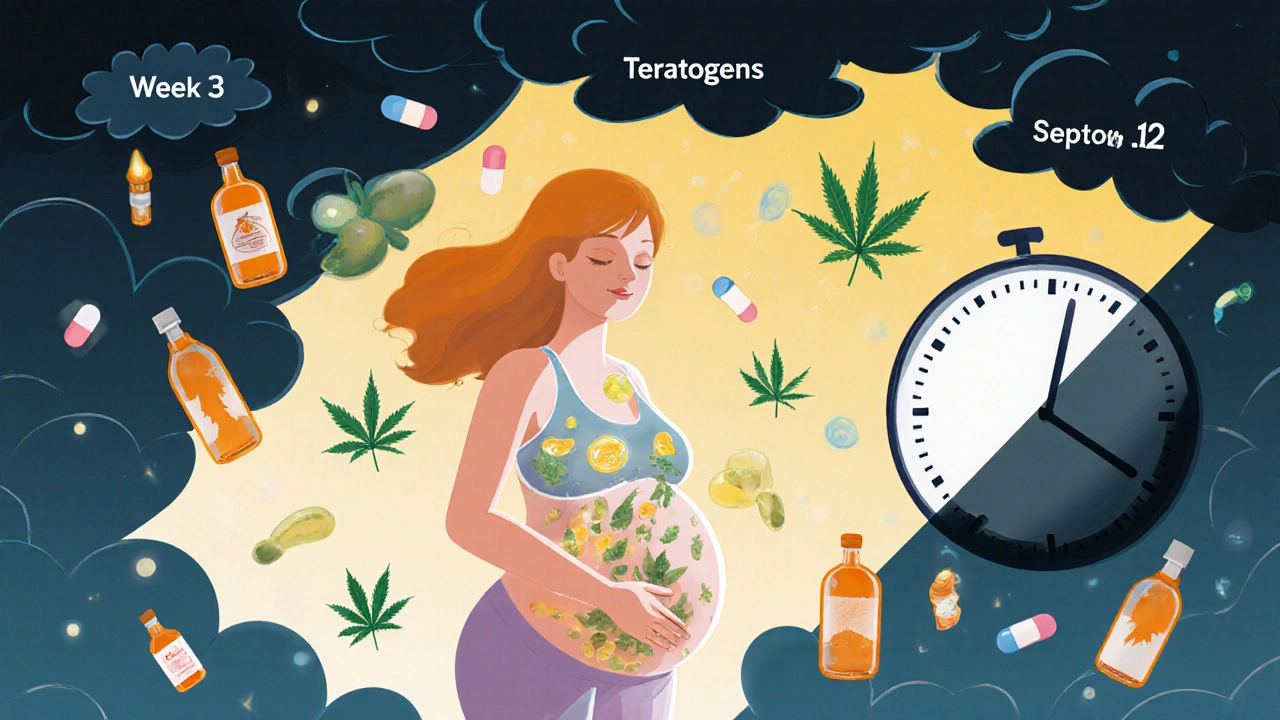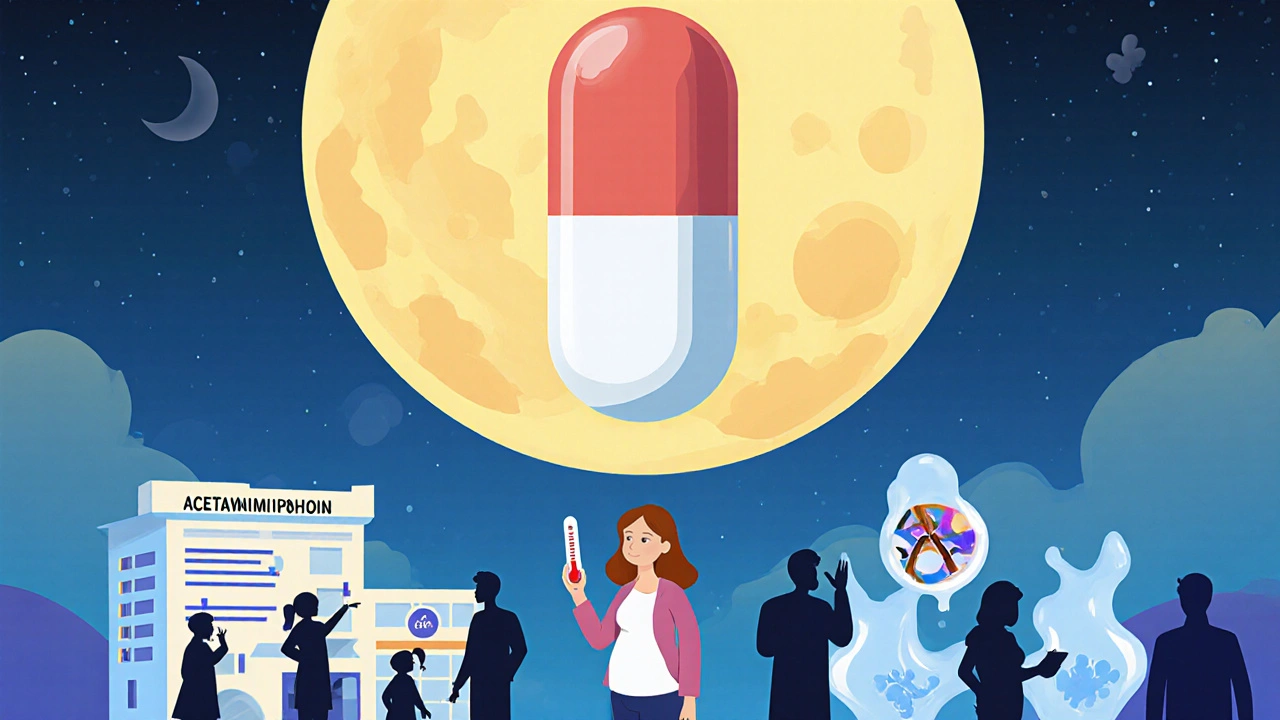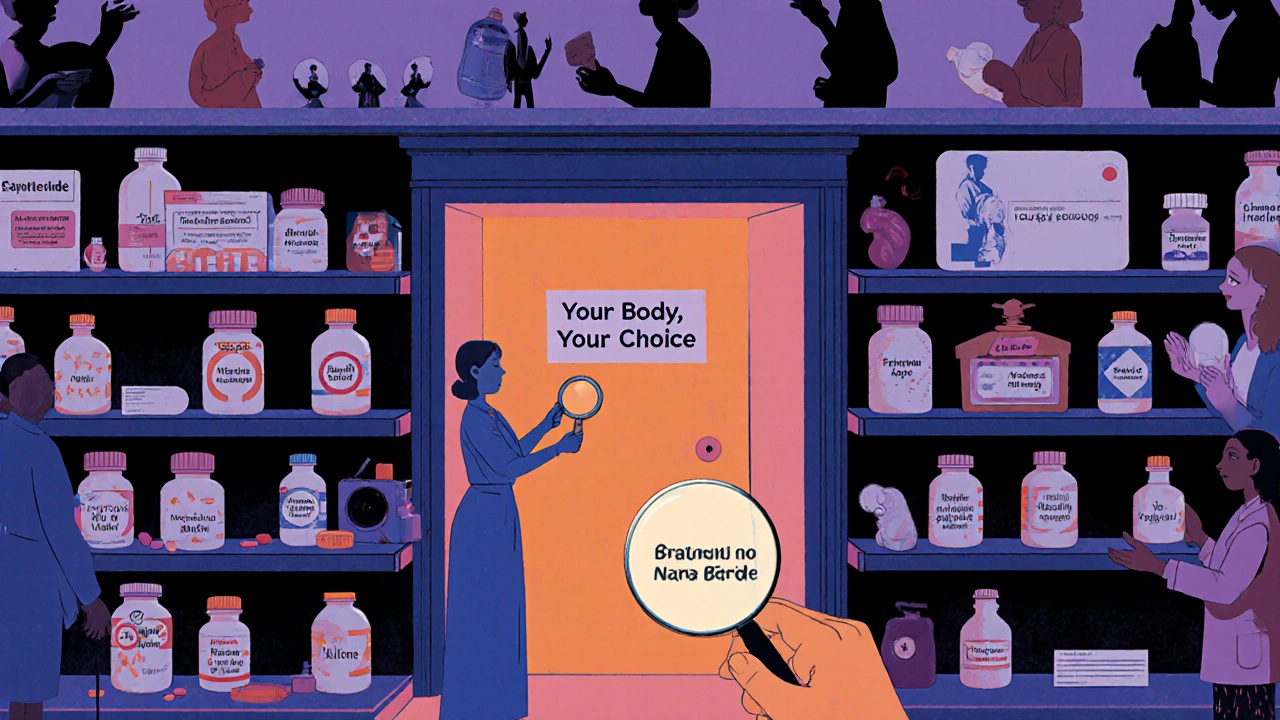
When you’re pregnant, every decision feels bigger. That cough syrup you reach for. The painkiller you take for a headache. The antidepressant you’ve been on for years. You wonder: could this hurt my baby? The truth isn’t simple. Some medications are clearly dangerous. Others are safe-or at least safer than the illness they treat. And for many, we just don’t know for sure.
What Exactly Is a Teratogen?
A teratogen is any substance that can interfere with fetal development and cause birth defects. It’s not just drugs. Alcohol, tobacco, certain infections like rubella, and even high fevers can act as teratogens. But when we talk about medications, we’re looking at prescription pills, over-the-counter drugs, herbal supplements, and even recreational substances like cannabis. The most famous example is thalidomide. In the late 1950s, this sedative was sold widely in Europe and Canada to help with morning sickness. By 1961, more than 10,000 babies were born with missing or shortened limbs because their mothers took it between days 20 and 36 of pregnancy-the exact window when arms and legs form. That tragedy changed medicine forever. Today, every drug’s potential to harm a developing baby is scrutinized before it’s approved.When Does Risk Happen?
Not all stages of pregnancy carry the same risk. The first trimester-weeks 1 to 12-is the most critical. That’s when your baby’s organs are forming. If a medication disrupts that process, it can lead to major structural problems: a cleft palate, a heart defect, or missing fingers or toes. Between weeks 15 and 60 after conception, the embryo is most vulnerable. That’s why doctors tell you to avoid non-essential meds during this time. After week 12, the big structures are mostly done. But that doesn’t mean you’re safe. In the second trimester, drugs can still affect brain development, hearing, or eye formation. In the third trimester, the risks shift. Now it’s about how the drug affects your baby’s function-like causing withdrawal symptoms, low blood sugar, or breathing problems after birth.Medications With Known Risks
Some drugs have clear, well-documented dangers during pregnancy:- Warfarin (a blood thinner): Can cause fetal warfarin syndrome-problems with facial bones, eyesight, and brain development. Risk is highest in the first trimester.
- Methotrexate (used for cancer, rheumatoid arthritis, and ectopic pregnancies): Increases neural tube defect risk by 10-20%. Must be stopped at least 3 months before trying to conceive.
- Carbamazepine (for epilepsy): Carries a 1% risk of spina bifida and can cause vitamin K deficiency in newborns, leading to dangerous bleeding.
- Factor Xa inhibitors (rivaroxaban, apixaban): These newer blood thinners cross the placenta. No antidote exists if bleeding occurs. Avoid entirely during pregnancy.
- Cannabis (THC): Linked to lower birth weight, preterm birth, and stillbirth. THC stays in breastmilk for up to six days and may affect your baby’s brain development, leading to attention and learning problems later.

The Acetaminophen Controversy
Acetaminophen (also called paracetamol) is the go-to pain reliever for pregnant women. It’s in Tylenol, Panadol, and hundreds of cold and flu mixes. For decades, it was considered safe. But in recent years, some studies started linking long-term use during pregnancy to higher risks of ADHD and autism in children. The CDC says these associations exist-but they haven’t proven cause and effect. Meanwhile, the American College of Obstetricians and Gynecologists (ACOG) came out strongly in September 2025, saying: “The conditions you’re treating-fever, severe pain-are far more dangerous than any theoretical risk from acetaminophen.” Untreated fever during early pregnancy can raise the risk of neural tube defects by 20-30%. So what’s a pregnant person supposed to do? Use the lowest dose for the shortest time possible. Don’t take it daily unless your doctor says so. But if you have a fever or a migraine, don’t avoid it out of fear. The risks of not treating the symptom may be worse.Why So Much Uncertainty?
You might wonder: Why don’t we know more? Why aren’t there clear answers for most drugs? Because we can’t test them the way we test other medicines. You can’t randomly give a pregnant woman a new drug to see if it causes birth defects. That’s unethical. So almost all the data we have comes from watching what happens when women accidentally take a drug during pregnancy-or from animal studies, which don’t always match human outcomes. About 95% of what we know about medication safety in pregnancy comes from observational studies. That means we see patterns, but we can’t prove why they happen. And for 70-80% of medications, there simply isn’t enough data to say they’re safe.What About the Old Letter System?
You might still see old labels with A, B, C, D, X. That was the FDA’s old pregnancy risk system. Category A meant “safe.” Category X meant “don’t use-it causes birth defects.” But that system was too simple. A drug labeled “C” could mean “maybe risky” or “risky only in high doses.” It didn’t tell you when the risk happened, how likely it was, or what the alternative was. In 2015, the FDA replaced it with the Pregnancy and Lactation Labeling Rule (PLLR). Now, drug labels include detailed sections: “Pregnancy Exposure Registry,” “Clinical Considerations,” and “Data.” You’ll see phrases like “animal studies show fetal harm” or “no adequate human studies.” It’s more helpful-but harder to read quickly.
What Should You Do?
Here’s the practical advice, straight from experts:- Plan ahead. If you’re thinking about getting pregnant, talk to your doctor about every medication you take-prescription, OTC, supplements, and herbs. Don’t wait until you’re pregnant.
- Don’t stop meds cold turkey. For conditions like epilepsy, high blood pressure, or depression, stopping your medicine can be more dangerous than staying on it. Seizures, strokes, or severe depression can harm both you and your baby.
- Use the lowest effective dose. Even safe meds can have side effects if taken too long or too often.
- Check the label. Prescription labels now include pregnancy warnings. Don’t rely on Google. A Reddit post or a Facebook group isn’t medical advice.
- Call MotherToBaby. This free service (run by experts in teratology) answers questions about medication exposure during pregnancy. They handle over 10,000 calls a year. You can call, text, or chat online. They’re not salespeople. They’re scientists.
- Include your pharmacist. Pharmacists are trained to spot dangerous interactions and can help you find safer alternatives.
Real Stories, Real Anxiety
Many women report panic after taking a medication before realizing they were pregnant. About half of all pregnancies are unplanned. So it’s common to be on birth control, miss a pill, and end up pregnant while still taking your usual meds. One woman on Reddit wrote: “I took Zofran for nausea for three weeks before I knew I was pregnant. Now I’m terrified. My OB said it’s fine. But I read it might cause heart defects. Which one do I believe?” That’s the problem. Conflicting messages. Fear. Guilt. And no easy answers. The truth? Most women who take medications during pregnancy have healthy babies. The majority of drugs don’t cause harm. But we can’t assume safety-we have to assess risk.What’s Changing?
The field is slowly improving. The FDA is expanding its Sentinel Initiative, tracking 10 million patient records to find patterns in real-world use. Researchers are starting to use genetics to predict who might be more sensitive to certain drugs. In five years, we might be able to say: “Based on your genes, this drug is likely safe for you.” But right now, the best tool you have is information-and a trusted healthcare team. Don’t try to figure it out alone. Talk to your doctor. Ask your pharmacist. Call MotherToBaby. Write down your questions. Bring them to your appointment. Your baby’s health matters. But so does yours. A healthy mother is the best foundation for a healthy baby.Can I take ibuprofen while pregnant?
Avoid ibuprofen after 20 weeks of pregnancy. It can cause low amniotic fluid and kidney problems in the baby. Before 20 weeks, occasional use is generally considered low risk, but acetaminophen is still preferred. Always check with your provider before taking any NSAID.
Is it safe to take antidepressants during pregnancy?
For many women, yes. Untreated depression increases the risk of preterm birth, low birth weight, and developmental delays. SSRIs like sertraline and citalopram are commonly used and have the most safety data. Stopping medication suddenly can trigger a relapse, which is dangerous. Work with your psychiatrist and OB to find the lowest effective dose.
What if I took a medication before I knew I was pregnant?
Don’t panic. Most medications don’t cause birth defects, and many exposures happen before the embryo is even attached to the uterus. The critical window for major defects is between weeks 3 and 8. If you took a drug before that, the risk is often very low. Call MotherToBaby or your OB-they can help you assess the actual risk based on timing, dose, and drug type.
Are herbal supplements safe during pregnancy?
Many are not. Herbal products aren’t regulated like drugs, so their strength and ingredients can vary. Some, like black cohosh and goldenseal, can trigger contractions. Others, like chamomile and ginger (in small amounts), are generally okay for nausea. Always tell your provider what supplements you’re taking-even if you think they’re “natural.”
Can I breastfeed if I took a medication during pregnancy?
Most medications that are safe during pregnancy are also safe while breastfeeding, but not all. Some drugs, like certain antidepressants or thyroid meds, pass into breastmilk in small amounts. LactMed, a free database from the NIH, has up-to-date info. If you’re unsure, ask your pharmacist or consult MotherToBaby.






14 Comments
Been a pharmacist for 15 years and let me tell you the biggest myth is that acetaminophen is totally harmless. It’s not. Long-term daily use? Yeah that’s linked to neurodevelopmental stuff. But if you’ve got a 102 fever and you’re shaking? Take the damn Tylenol. The fever’s gonna hurt your baby more than the drug. Don’t let fear paralyze you. Use it smart, not scared.
/p>OMG I took ibuprofen at 16 weeks because my back was killing me and now I’m convinced my kid’s gonna be a robot with no kidneys 😭 but my OB laughed and said it’s fine if it was one time?? I need to know if I’m gonna be a terrible mom or not
/p>Y’all are overthinking this so hard. You’re not a bad person for taking medicine. You’re a human being trying to survive pregnancy. Your body’s doing the impossible. If you need a pill to feel human again? Take it. Guilt doesn’t protect babies. Love does. And love means taking care of yourself too.
/p>I took Zofran for 6 weeks before I knew I was pregnant. Called MotherToBaby. They walked me through the data. Risk of heart defects? 0.1%. Like, less than being struck by lightning. I cried. Not from fear-from relief. If you’re panicking, just call them. They don’t judge. They just give you facts.
/p>Let me ask you this-if a drug can cross the placenta, does that mean it’s inherently evil? Or does it mean biology is just… messy? We evolved to survive chaos. A fetus isn’t a porcelain doll. It’s a biological system that adapts, bends, sometimes breaks. We treat pregnancy like a glitch in the matrix. But it’s not. It’s raw, brutal, beautiful evolution. Stop trying to sanitize it with checklists. Trust your body. Trust your doctor. And for god’s sake, stop reading Reddit like it’s a medical journal.
/p>It is an undeniable fact that the pharmaceutical industry has systematically underrepresented pregnant populations in clinical trials, resulting in a profound epistemological deficit in maternal-fetal pharmacology. This institutional negligence has precipitated a crisis of evidentiary authority, wherein patients are left to navigate probabilistic risk landscapes with inadequate scaffolding. The replacement of the FDA letter system with the PLLR, while ostensibly more nuanced, merely obscures the fundamental absence of robust data under a veneer of bureaucratic complexity.
/p>So let me get this straight… we’re supposed to trust a system that didn’t know thalidomide was lethal until 10,000 babies were born? And now we’re supposed to believe that ‘no adequate human studies’ means ‘probably safe’? 😂 I’m not taking anything. I’m not even taking a sip of coffee. My baby deserves better than a gamble dressed up as science.
/p>Everyone’s acting like acetaminophen is the devil. But have you seen the data on untreated fever? It’s 20-30% higher risk of neural tube defects. So you’re choosing between a 0.5% theoretical risk of ADHD from Tylenol… or a 30% chance your baby’s spine didn’t form right? I’d take the ADHD. At least they’ll be alive to complain about it. Also-stop taking herbal tea like it’s medicine. Chamomile is fine. Goldenseal? That’s a uterine stimulant. You think you’re being ‘natural’? You’re just being dumb.
/p>Let’s be real-this whole post is corporate propaganda. Big Pharma doesn’t want you to know that most of these drugs are tested on rats and then sold to pregnant women like it’s a lottery. They don’t care if your kid has autism. They care about the next quarter’s earnings. MotherToBaby? It’s funded by the same companies that make the drugs. You think they’re giving you the truth? They’re giving you the version that won’t get them sued.
/p>bro i took ibuprofen at 10 weeks and now my daughter is 3 and she’s the smartest kid in her class 😌 maybe the universe just wants us to chill? also if you’re scared just call your doc. no need to spiral. we got this 💪
/p>In India, we have a saying: ‘The womb is not a lab. It is a temple.’ We don’t test drugs on pregnant women. We trust the wisdom of grandmothers, the rhythm of the body, the silence between breaths. Maybe the answer isn’t more data… but more trust. Not in pills. Not in studies. But in the quiet strength of a woman carrying life.
/p>They’re lying to you. The FDA knows exactly what these drugs do. They just don’t want you to panic. Why? Because if you stop taking your antidepressants, you’ll go crazy and sue them. So they say ‘it’s fine’ while quietly funding studies that prove it’s not. I’ve seen the emails. They’re coming for your baby’s brain. Wake up.
/p>Why do you think so many babies have autism now? Because moms took Tylenol. Simple. No science needed. Just look around.
/p>You’re not alone in this fear. I’ve been there. I took Zofran. I cried every night. But I also called my OB, I talked to MotherToBaby, I read the real studies-not the Reddit posts. And I had a healthy baby. You don’t have to be perfect. You just have to be willing to ask. And you’re already doing that. That’s enough. You’re doing better than you think.
/p>